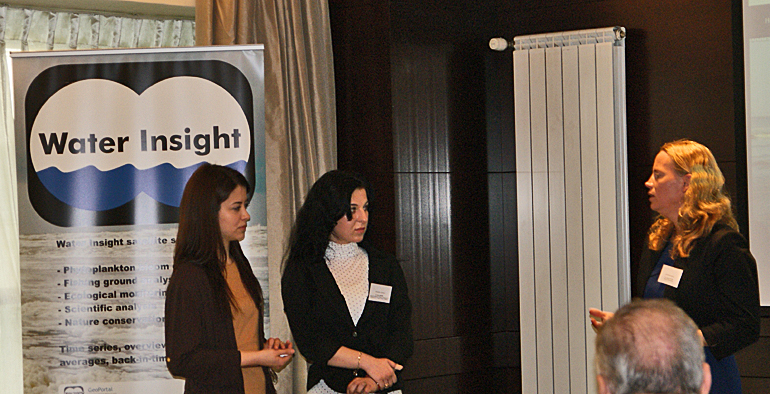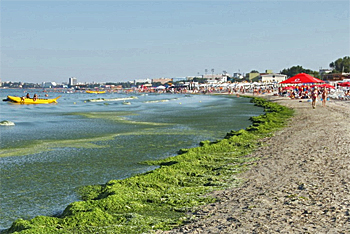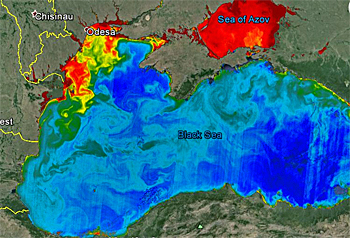Workshop on Black Sea algae problems highlights Dutch-Romanian cooperation during trade mission
 Romanian and Dutch experts shared the results of the Basisism water quality monitoring project during the workshop 'Towards satellite-based solutions for the Black Sea algae problem' in Bucharest on 23 April.
Romanian and Dutch experts shared the results of the Basisism water quality monitoring project during the workshop 'Towards satellite-based solutions for the Black Sea algae problem' in Bucharest on 23 April.
The workshop was opened by Dutch Minister Lilianne Ploumen of Foreign Trade and Development Cooperation. She was in Romania leading a trade mission of 24 Dutch companies from the agri-food, water, horticulture and logistics sectors.
Oana Vlas (left on top photo) and Oana Marin (middle) of the National Institute for Marine Research and Development (NIMRD) contributed to the workshop, giving an overview on the occurrence of algal blooms in the Black Sea.
Algal bloom events have contaminated the beaches on the Black Sea coast for many years, negatively affecting both fisheries and tourism sectors.
 Monitoring algae bloom on daily basis
Monitoring algae bloom on daily basis
Two Dutch companies worked on a monitoring system for the water quality along the Romanian coast, based upon a sophisticated and reliable analysis of the colour spectrum of the water body.
The system automatically retrieves the latest satellite images on a daily basis, and creates water quality maps out of this. The maps are displayed in a user friendly system which allows the combination with sampling data and therefore supports easy analysis.
At the workshop the server with the Integrated water quality system was handed over to the National Institute for Marine Research and Development ‘Grigore Antipa’.
The Danube Delta Institute and National Administration “Romanian Waters” Dobrogea – Litoral will get an easily accessible online connection.
 Zoom in on Danube Delta
Zoom in on Danube Delta
The results presented at the workshop showed water quality maps of the entire eastern Black Sea coast and the possibility to zoom in on the lakes in the difficult accessible Danube Delta. The calculated concentrations are read out per pixel.
By collecting data over the years it is possible to discover trends and gain insight in the variation between years and seasons.
Such analysis can lead to the detection of the sources of pollution, so the algae problem can be tackled.
Comparison with standard algae measurement
During the Basisims project measurements were also carried out with the optical hand held WISP-3 instrument that is developed by the Dutch company Water Insight. These measurements were compared with the standard measurements carried out by the laboratory of the Romanian National Institute for Marine Research and Development (NIMRD).
According to the presentation at the workshop the measurements were very similar, and provided a clear confirmation of the potential of optical data, for the Danube Delta and the Black Sea.
About the Basisims project
During the Basisisms project, a Black Sea Integrated Satellite and In situ water quality Monitoring System was developed by the Dutch companies Water Insight and Nelen & Schuurmans.
The project was conducted in close cooperation with three Romanian partners: National Institute for Marine Research and Development 'Grigore Antipa' (NIMRD), Danube Delta National Institute for R&D (DDNI) and Water Administration Dobrogea – Litoral (ABA-DL).
The developed water quality information system combines in situ measurements and satellite images to create an operational web-based system for water quality monitoring and analyses.
The project is financed by the Dutch government from the Partners for Water programme.
More information
Black Sea Integrated Satellite and In situ water quality monitoring system (Basisims)
www.basisims.net
Water Insight
Wageningen, the Netherlands
+31 317 210 004
www.waterinsight.nl
Nelen & Schuurmans
Utrecht, the Netherlands
+31 30 233 02 00
www.nelen-schuurmans.nl



